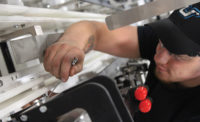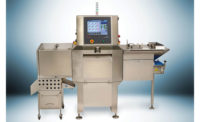When you’re packaging a product like beef jerky, the last thing you want to see is product getting caught in the seal of the bag and impacting product freshness. This was the challenge faced by Oberto Sausage Company of Kent, WA. Oberto offers 400 varieties of dried meat products like beef jerky, as well as pork and turkey jerky, and snack sausages. The company, which will celebrate its 100th anniversary next year, offers such brand names as Oberto, Cattleman’s Cut, Pacific Gold and others. The products are packaged in 1.25-ounce to 15-ounce bags and are carried in supermarkets and club stores nationwide.
When Oberto reformulated some of their beef jerky products, it ran into issues with smaller product particulates getting caught in the seal area, thus causing leakers and rejects. More workers were needed to inspect the bags, which slowed down production speed.
To solve production challenges, Oberto turned to Triangle Package Machinery Company (trianglepackage.com). A long-term customer of Triangle, Oberto has utilized several Triangle heat-seal baggers for the last 15 years. Triangle proposed the Model XYS08 vertical form fill seal (VFFS) bagger with an ultrasonic sealing system provided by Herrmann Ultrasonics (herrmannultrasonics.com), along with an Ishida (ishida.com) radial scale Model RV-214W-1S/30-WP.
“Ultrasonic technology seemed to have a much cleaner seal that would allow us to deliver quality products to our customers,” states TJ Bollinger, sr. project engineer, Oberto.
Although ultrasonic sealing was a new technology for this customer, Oberto’s VP of research & development, Mike Tull, embraced the idea from the start. Fortunately, his early adoption paid off when Oberto saw success as early as initial test runs. Immediately, the new equipment was able to seal through fines of beef jerky and virtually eliminate leakers. In fact, the ultrasonically sealed bags were able to pass a two-hour test at 25 inches of vacuum from the start. And, the fact that the ultrasonic seal is hermetic significantly improved product freshness.
In addition, ultrasonic seal jaws decreased seal surface from 1.25 inches to less than 0.25 inches. Added benefits included reducing the amount of packaging material needed and doubling production speeds. Bagging speeds went from 35-40 bags per minute to 75 bags per minute.
“We were able to decrease the spoilage rate and run at a higher speed,” says Mike Eads, maintenance supervisor at Oberto’s Kent, WA facility.
The Triangle integrated solution allows for complete control of the ultrasonic system through the bagging machine’s HMI. Triangle also provided a combination of in-house and onsite training.
Ultrasonics: An alternative to heat sealing
Ultrasonic sealing has become a trusted alternative to traditional heat sealing over the last two decades. Because the ultrasonic system is based on vibrational energy, not a conductive heat process, the ultrasonic tools remain cold and have basically no thermal impact on material and fill goods.
Triangle has embraced ultrasonic sealing with cold tools for various markets like leafy produce, powders, meat products and seafood. The company’s X-Series VFFS baggers help improve OEE and even offer the flexibility to easily switch between ultrasonic cross seals and traditional heat seals if material properties dictate that. Herrmann Ultrasonics is an industry supplier of ultrasonic sealing modules for flexible bags and pouches as well as carton packaging, blisters and capsules.
Oberto is pleased with the project outcome.
“The bagger creates a consistent seal that increases the quality of the products that our customers enjoy and expect from our company. We have seen great results in seal technology, while increasing our performance,” says Bollinger.
“Ultrasonic sealing … is well worth the investment,” agrees Eads.
About the companies:
Oberto Sausage Company
Kent, WA | 877-453-7591
Triangle Package Machinery Co.
Chicago, IL | 773-889-0200 | info@trianglepackage.com
Herrmann Ultrasonics Inc.
Bartlett, IL | 630-626-1626 | cassandra.thibodeau@herrmannultrasonics.com
|
How Ultrasonic sealing works Ultrasonics works by introducing vibrational energy into the area to be sealed. The ultrasonic principle is to convert voltage into vibrations of 20-35 kHz, which will melt and bond the film material (20 kHz is 20,000 movements per second). This also explains why it is possible to seal through product residues. The mechanical vibrations will literally shake away all remains in the seal area. Compared with conventional heat sealing, where heat jaws transfer the heat from the outside into the film, ultrasonic technology generates the required temperature for the sealing process from the inside out. The ultrasonic tools stay cold and the thermal load for fill goods and material is very low. Cycle times are typically between 80ms and 200ms. Systems can be operated immediately, with no ramp up or start up process time required. By storing the sealing parameters in the memory of the ultrasonic generator, it is possible to switch automatically between parameter sets. The changes take effect immediately with the start of the next sealing operation, which means no lost production time due to product or material changeovers. |




